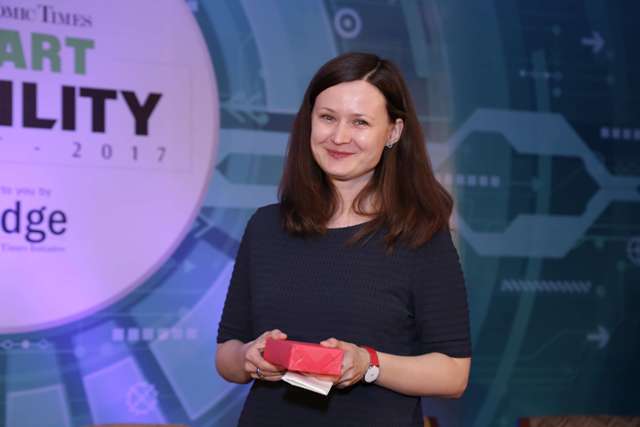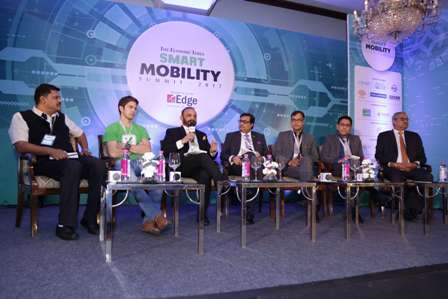 13th December’17, Mumbai: With the Indian Transportation Network growing ever larger, The Economic Times saw the need to cultivate a platform for industry big-wigs, environmentalists, researchers, transport industries and various stakeholders to discuss the greenhouse gas effect to address environmental issues and decrease their dependence on oil as a source of fuel. The Economic Times Smart Mobility Summit 2017, held at The Taj, New Delhi, saw prominent industry experts aimed to lay down a blueprint for the future, driven by innovation and the vision to provide cleaner, safer and faster transportation infrastructure.
13th December’17, Mumbai: With the Indian Transportation Network growing ever larger, The Economic Times saw the need to cultivate a platform for industry big-wigs, environmentalists, researchers, transport industries and various stakeholders to discuss the greenhouse gas effect to address environmental issues and decrease their dependence on oil as a source of fuel. The Economic Times Smart Mobility Summit 2017, held at The Taj, New Delhi, saw prominent industry experts aimed to lay down a blueprint for the future, driven by innovation and the vision to provide cleaner, safer and faster transportation infrastructure.
 The initiative retorted with resolutions for the transportation sector that requires constant restructuring and new age solutions. With a strong bequest established with the past summits on Transportation, ET Edge continues to fuel the nation’s growth with visionaries across Industries, like Amitabh Kant, CEO, NITI Aayog, Greg Moran, Co-Founder & CEO, Zoomcar, Vikramjiet Roy, Managing Director, Maccaferri India, Dr Kamal Soi, Member at National Road Safety Council – Ministry of Road Transport & Highways & several others for the said summit.
The initiative retorted with resolutions for the transportation sector that requires constant restructuring and new age solutions. With a strong bequest established with the past summits on Transportation, ET Edge continues to fuel the nation’s growth with visionaries across Industries, like Amitabh Kant, CEO, NITI Aayog, Greg Moran, Co-Founder & CEO, Zoomcar, Vikramjiet Roy, Managing Director, Maccaferri India, Dr Kamal Soi, Member at National Road Safety Council – Ministry of Road Transport & Highways & several others for the said summit.
Commenting on the summit, Deepak Lamba, President, Times Strategic Solutions, said, “The objective is to create the largest and most relevant forum in the country that creates the effective platform for discussing issue pertaining to transportation network of the country. It also aims to bring the government together with private players, corporates and consultants for the betterment of the nation. This indication of significant challenges requires a crucial address that will be initiated at summit, which brings together all key note speakers on a shared platform to discuss optimal solutions.”
Highlighting the efforts undertaken by the Government to take the transportation infrastructure in the country to the next level Amitabh Kant, CEO, NITI Aayog said, “The future lies in innovation and disruption. We are moving towards a system where public transportation holds the key as we move away from personal vehicles. This will be a world of shared, electric and connected vehicles, and this in turn will require real-time monitoring. Therefore, the future lies in having better public transportation and shared infrastructure.”
In an interactive panel discussion on the case for Smart transportation for Smart Cities –
 Greg Moran, Co-Founder & CEO, Zoomcar commented, “When we launched India’s first cycle sharing service some months back, we looked at it as solving both first and last-mile connectivity issues. I’ve lived in Bengaluru for the last 5 years, and walking even 2-3 kilometres is quite challenging. Taking taxis or rickshaws are inefficient from a cost, time and environmental standpoint. Shared mobility solutions like cycle sharing are great for the last-mile, cost a fraction of other modes of transport and don’t rely on the creation of fresh infrastructure.” Further sharing his inputs Dr Kamal Soi, Member at National Road Safety Council – Ministry of Road Transport & Highways added, “When I look at our 100 upcoming Smart Cities, 3 C’s come to mind. Those 3 C’s are Congestion, Congestion and Congestion. Be it Delhi, Bengaluru, Chennai or wherever you go, it is equally true. So we need to move towards smart mobility and urban planning as we move forward.”
Greg Moran, Co-Founder & CEO, Zoomcar commented, “When we launched India’s first cycle sharing service some months back, we looked at it as solving both first and last-mile connectivity issues. I’ve lived in Bengaluru for the last 5 years, and walking even 2-3 kilometres is quite challenging. Taking taxis or rickshaws are inefficient from a cost, time and environmental standpoint. Shared mobility solutions like cycle sharing are great for the last-mile, cost a fraction of other modes of transport and don’t rely on the creation of fresh infrastructure.” Further sharing his inputs Dr Kamal Soi, Member at National Road Safety Council – Ministry of Road Transport & Highways added, “When I look at our 100 upcoming Smart Cities, 3 C’s come to mind. Those 3 C’s are Congestion, Congestion and Congestion. Be it Delhi, Bengaluru, Chennai or wherever you go, it is equally true. So we need to move towards smart mobility and urban planning as we move forward.”
 Giving his view on role of technology is todays’ life Vikramjiet Roy, Managing Director, Maccaferri India said, “While we are talking about technology and innovations, I think we cannot wish away the fact that we do need to build high quality physical infrastructure. Integrated planning lies at the centre of it. There could be innovations and disruptions not too far in the future, but we need to build the physical infrastructure to make the most of it, and we need to embrace the best technologies available globally to make this happen.”
Giving his view on role of technology is todays’ life Vikramjiet Roy, Managing Director, Maccaferri India said, “While we are talking about technology and innovations, I think we cannot wish away the fact that we do need to build high quality physical infrastructure. Integrated planning lies at the centre of it. There could be innovations and disruptions not too far in the future, but we need to build the physical infrastructure to make the most of it, and we need to embrace the best technologies available globally to make this happen.”
The summit witnessed exchange of dialogues from various panellists on Transport in the Digital Age, Waste to Bio-Fuels, Challenges with methane slip, and reduction of carbon footprint due to associated gasses and Rethinking Efficient Transportation, Electrification of Public Transport – Lessons from European Cities amongst others.






